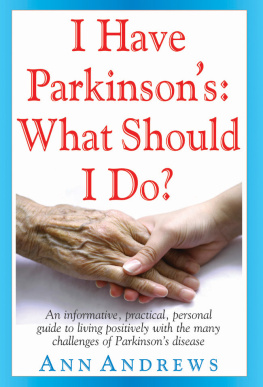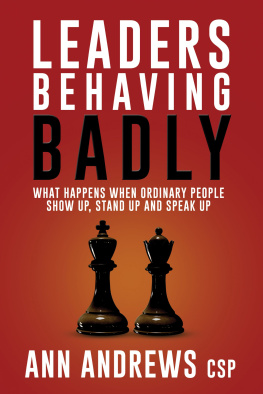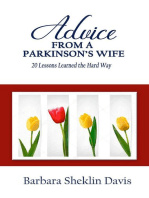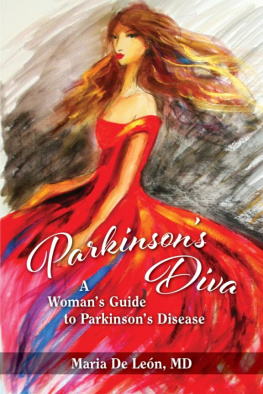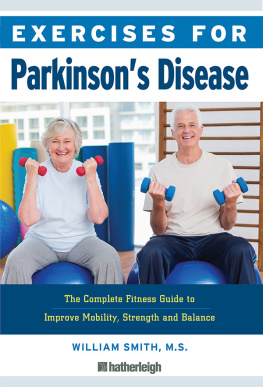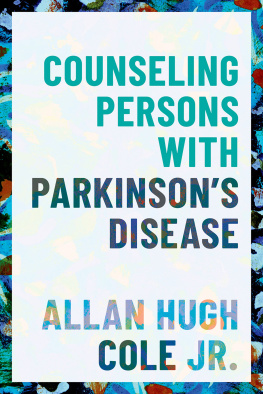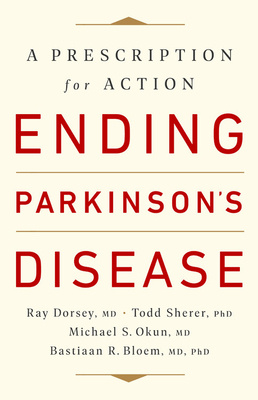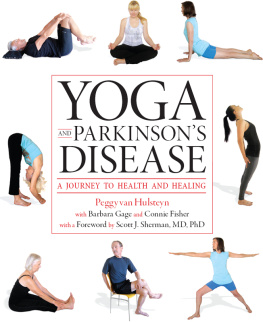Ann Andrews - I Have Parkinsons: What Should I Do?
Here you can read online Ann Andrews - I Have Parkinsons: What Should I Do? full text of the book (entire story) in english for free. Download pdf and epub, get meaning, cover and reviews about this ebook. year: 2011, publisher: Basic Health Publications, genre: Home and family. Description of the work, (preface) as well as reviews are available. Best literature library LitArk.com created for fans of good reading and offers a wide selection of genres:
Romance novel
Science fiction
Adventure
Detective
Science
History
Home and family
Prose
Art
Politics
Computer
Non-fiction
Religion
Business
Children
Humor
Choose a favorite category and find really read worthwhile books. Enjoy immersion in the world of imagination, feel the emotions of the characters or learn something new for yourself, make an fascinating discovery.
- Book:I Have Parkinsons: What Should I Do?
- Author:
- Publisher:Basic Health Publications
- Genre:
- Year:2011
- Rating:4 / 5
- Favourites:Add to favourites
- Your mark:
- 80
- 1
- 2
- 3
- 4
- 5
I Have Parkinsons: What Should I Do?: summary, description and annotation
We offer to read an annotation, description, summary or preface (depends on what the author of the book "I Have Parkinsons: What Should I Do?" wrote himself). If you haven't found the necessary information about the book — write in the comments, we will try to find it.
An informative, practical, personal guide to living positively with the many challenges of Parkinsons disease.
I Have Parkinsons: What Should I Do? — read online for free the complete book (whole text) full work
Below is the text of the book, divided by pages. System saving the place of the last page read, allows you to conveniently read the book "I Have Parkinsons: What Should I Do?" online for free, without having to search again every time where you left off. Put a bookmark, and you can go to the page where you finished reading at any time.
Font size:
Interval:
Bookmark:

I Have
Parkinson's:
What Should
I Do?
The information contained in this book is based upon the research and personal and professional experiences of the authors. It is not intended as a substitute for consulting with your physician or other healthcare provider. Any attempt to diagnose and treat an illness should be done under the direction of a healthcare professional.
The publisher does not advocate the use of any particular healthcare protocol but believes the information in this book should be available to the public. The publisher and authors are not responsible for any adverse effects or consequences resulting from the use of the suggestions, preparations, or procedures discussed in this book. Should the reader have any questions concerning the appropriateness of any pro cedures or preparation mentioned, the authors and the publisher strongly suggest consulting a professional healthcare advisor.
Basic Health Publications, Inc.
28812 Top of the World Drive
Laguna Beach, CA 92651
949-715-7327 www.basichealthpub.com
Library of Congress Cataloging-in-Publication Data
is on file with the Library of Congress
Copyright 2011 by Ann Andrews.
First published by Calico Publishing Ltd.
All rights reserved. No part of this publication may be reproduced,
stored in a retrieval system, or transmitted, in any form or by any
means, electronic, mechanical, photocopying, recording, or otherwise,
without the prior written consent of the copyright owner.
Editors: Karen Anspach & Cheryl Hirsch
Typesetting/Book design: Gary A. Rosenberg
Illustrations: Sally Hollis-McLeod
Cover design: Mike Stromberg
Printed in the United States of America
10 9 8 7 6 5 4 3 2 1
To my friends with Parkinson's
who shared their experiences
so that others might benefit
There is a saying in Parkinson's disease medicine that when you have seen one person with Parkinson's disease, you have seen one person with Parkinson's disease. Parkinson's is a complex and intensely personal disease. Each person, patient, carer or health professional is affected in different ways, and each person has a story to tell. I have been working now for twenty-five years with people with Parkinson's disease, and not a week goes by when I don't learn something new. I am repeatedly reminded that each person has a unique version of the disease.
There is so much to learn and so much to know about living with the condition. There is also a bewildering amount of information in books and on the Internet. Much of this information is impersonal, clinical, and of uncertain relevance to someone coming to terms with their own version of a variable condition.
Ann has her own story of Parkinson's, and here she has also gathered the stories of others. Each is important, each is relevant, and each deserves to be heard. My congratulations to Ann for taking on this task; I hope everyone values reading this book as much as I have.
Barry Snow, M.D.
Fellow of the Royal Australasian College of Physicians (FRACP)
Fellow of the Royal College of Physicians (FRCPC)
My sincere thanks to those at the Centre for Brain Research at the University of Auckland who have helped me better understand the complexities of the Parkinson brain. Particular thanks to Professor Richard Faull, Director of the Centre for Brain Research, for allowing me such free access to his staff; to Associate Professor Bronwen Connor, for patiently teaching me about stem cells and for cross-checking my material; to Associate Professor Debbie Young, for her explanation of gene therapy; to Dr. Cathy Stinear, for explaining neural plasticity; to Dr. Henry Waldvogel, for his advice on anatomy; and to Laura Fogg, the centre's manager, for her direction and advice.
Many thanks to neurologist Dr. Barry Snow, Honorary Clinical Associate Professor at the University of Auckland's School of Medicine, for encouraging and endorsing this project from concept to print.
Special thanks to movement clinic nurse Lorraine McDonald, for always being accessible and enthusiastic, and to my Parkinson's field officer Kay McGarry, for her practical advice. I am grateful for the support from Parkinson's New Zealand and to CEO Deirdre O'Sullivan in particular.
Warmest thanks to my friend, physiotherapist Dinah Bradley, for her many generous expressions of support and permission to use her material on breathing, and to speech therapist, Jeanette Gillibrand, who diligently put me through the Lee Silverman Voice Treatment course. Thanks also to dental hygienist Corinne Boes, for her dental care guidance; Barbs Baird for her yoga exercises; and my doctor Christine Forster for caring for me throughout.
Thanks are also due to occupational therapist Tracey Harrington; Geraint Phillips, Therapeutics Clinic Director, Department of Optometry and Vision Science, University of Auckland; music therapist Alison Cooper; lawyer Brian Gubb; finance advisor Murray Weatherston; dancer John Heginbotham.
My thanks to my editor and publisher Linda Cassells for having such faith in me and my writing, and to Sir John Walker for his participation and enthusiastic endorsement of the finished manuscript. My gratitude to Max Ritchie and Sue Giddens from the Neurological Foundation of New Zealand for their wholehearted support and endorsement, and to the David Levene Foundation for its unconditional generosity.
Last but not least, deepest thanks to my friends and colleagues, members of the Auckland Parkinson's Society and contributors to this book who have shared their own experiences of Parkinson's so generously: Dale Armstrong, Leslie Arnold, Robyn Egan, Christine Hayter, Roger and Glenis Hicks, Michael Jaffe, Pat Malloy, Judith Meaken, David and Anne Murrell, Maurice and Karen Nicholson, Kathy Pilbrow, Chandra Raniga, Warwick Roger, David Schafer, Raewyn Thorburn, and Don and Margie Woodward.
To my family, I send you love always and my thanks for belonging to you all.
T his book is written for people like me who have Parkinson's disease, and for our families, friends, doctors and those working in the field. It began as a wish to share everything I've learned about Parkinson's since diagnosis nearly twelve years ago. It is still the book I wish I'd had when first diagnosed, though it now contains information that you might not need till later. In this way it has become relevant to a much wider group. I see it as a book to be read through and then dipped into as the need arises.
What you will find here is a record of my own and others' experience of living with Parkinson's. It has been an opportunity for us to pass on to those of you newly diagnosed, and to your family and friends, something of what we have learned.
Over a series of informal get-togethers a group of us with Parkinson's realized we'd all had similar experiences after our initial diagnosis. Eager to learn as much as possible, we'd searched the Internet and local libraries only to find that much of the information was gloomy and depressing. We already felt depressed about the uncertainty of our future with this condition, and the material we read made us feel worse.
Most of us were diagnosed some years ago, and we have now reached a point where we would like to share some of our knowledge and experience, and to provide something more individual, less clinical, and hopefully more reassuring than what we first read.
So here it is. This book is meant for you, the one with Parkinson's. And you're not alone. There are a lot of us going through a similar experience to yours. We hope that by the time you've finished reading this book you'll want to share it with family and friends, so they too have a better understanding of Parkinson's. At the very least they might come to understand that Parkinson's is not just a tremor disease, but something much more complicated.
Font size:
Interval:
Bookmark:
Similar books «I Have Parkinsons: What Should I Do?»
Look at similar books to I Have Parkinsons: What Should I Do?. We have selected literature similar in name and meaning in the hope of providing readers with more options to find new, interesting, not yet read works.
Discussion, reviews of the book I Have Parkinsons: What Should I Do? and just readers' own opinions. Leave your comments, write what you think about the work, its meaning or the main characters. Specify what exactly you liked and what you didn't like, and why you think so.

